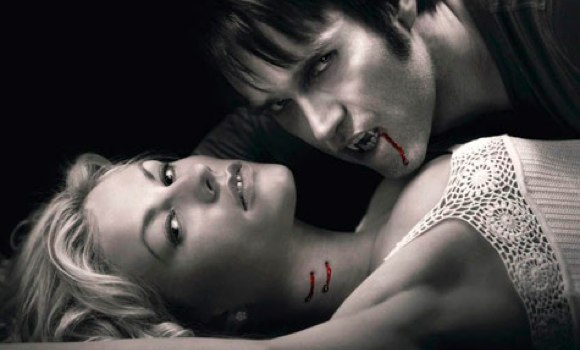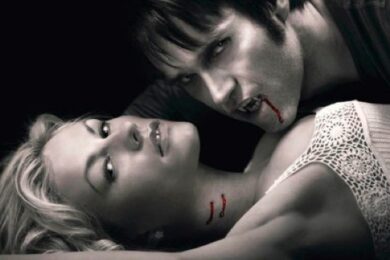It’s a common joke, truism, or platitude that nothing corrodes a relationship as quickly as the question, "What are you thinking?" This, however, is something which waitress Sookie Stackhouse has no desire to ask vampire Bill, as the fact that she cannot telepathically hear his thoughts, as she can with humans, is a blessed relief to her. It means she can "relax from constant effort, and be herself". It means she’s for once not getting bombarded with "too much information".
It’s not the only appeal Bill holds for her. He has a certain dark charm and, once she’s fed on his blood, she is granted heightened senses and a need to masturbate furiously in every spare moment. Their ‘romance’ is the core of True Blood, the much-hyped new HBO drama and the first from that hallowed stable to delve or lapse into areas of fantasy. Adapted by Alan Ball (Six Feet Under, American Beauty) from the novels by Charlaine Harris, it’s a torrid tumble of sex, drugs, blood, murder, soap-opera and, just occasionally, blinding insight.
Around the central couple there flounce a flurry of subsidiary
characters, or caricatures. Most of them are sex-mad. The black
characters are especially ludicrous and poorly-written — irritatingly whiney females or overblown gay stereotypes. None are as irksome however as Sookie, played by Anna Paquin as a helium-voiced, borderline-retarded Lolita, skipping vacantly towards danger with a level of foolishness that makes her not so much a heroine as a liability. Bill isn’t much more prepossessing. Sookie’s brother Jason is a self-proclaimed stud and less self-proclaimed idiot with more muscles than brain cells who loves to flex his pecs. It is small wonder that True Blood has been received with such raptures by female critics, as at times it is undisguised erotica for women, with most of the male leads resembling the members of Kings Of Leon if they had gym membership. As male critics have been applauding movies made by the male gaze for decades, this is fair enough, but the show is not as great as you may have been led to believe. Its presentation in the UK by Channel Four — complete with momentum-scuppering ad breaks every twenty seconds and on one notable occasion a complete loss of transmission during a climactic cliff-hanger scene — hasn’t helped it match the buzz with which it arrived.
And yet. It boasts perhaps the greatest opening credits sequence in TV history, as Jace Everett’s ‘I Wanna Do Bad Things To You’ grinds filthily over a brilliantly edited mosaic of lap dancers, rotting corpses, evangelists and general Lynch-like weirdness, the kind of weirdness that compels rather than repels. After a dozy opening episode it improves considerably, though it still has a way to go to ‘glamour’ us. Four years ago it would have been the best thing on TV. But in the wake of The Shield and the only slightly overrated The Wire it feels a touch flippant and trite, trying too hard to shock. Compared to the best "fantasy" or "sci-fi" — the brilliant Battlestar Galactica or the inconsistent yet sometimes dazzling Dollhouse — it’s all set-pieces, no fibre or thread. Obviously it means to be grand guignol, and makes no bones about it, but the characters are so comic-book it’s hard to care about them as one did for, say, Starbuck and Apollo in Battlestar, whose relationship took so many unexpected twists and turns that following it felt like reading a close friend’s diary.
How does it shape up on its own turf, that of vampire lore? It’s clever, certainly, with its hints that lone vampires are less bloodthirsty — more humane — than those who live in nests. It plays skilfully with their age, the horrors they’ve witnessed, their past lovers of decades gone. And the premise that they live among us, officially accepted if unofficially feared and distrusted, gives it ample scope for allegory. In Year Obama 001 there is some sharp satire regarding tolerance and prejudice, though not as much as the show has been credited with. True Blood is a sight more meaty than the teen-targeted Twilight books and movies but sorely lacks the wit, humour and all-round flair of Joss Whedon’s Buffy and Angel, which remain the benchmark for the smarter end of the genre. Indeed when one character mutters a wish that "Buffy, or Blade, or one of those bad-ass vampire killers" would show up, the script doesn’t so much impress us with its po-mo oh-so-knowing pop culture references as stake itself in the foot.
It’s a diverting enough show, as florid, daft, horny and watchable as, say, Dexter, and the snooty tone of this piece may be as much a reaction to the gushings of greatest-thing-ever praise which have been heaped on its neck as a reaction to its objective merits. It would have been easier to love if it had glided quietly into view, cloaked in shadowy mystery. The hype has meant that it’s run up to our faces shouting "Boo!" like a kid dressed in a Poundsaver ghost costume on Halloween Night. Maybe it’d be best to wait until everybody’s less lathered up and the ladies have taken some air, at which stage immersion in the DVDs, shorn of the coitus interruptus of those fatal, insensitive commercials, might seem a more engrossing experience. We may yet be effectively "glamoured" into not thinking too much and sucking it up.



